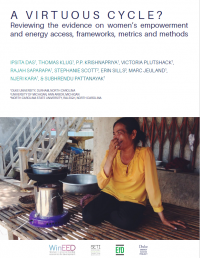Report - October 2020
A Virtuous Cycle? Reviewing the evidence on women’s empowerment and energy access, frameworks, metrics and methods
Energy is fundamental to achieving several Sustainable Development Goals (SDGs): alleviating poverty, advancing health, improving education and water and sanitation, and addressing climate change. However, nearly 1.2 billion people still lack access to electricity (IEA 2015), and about 3 billion continue to use polluting fuels and inefficient technologies for cooking (WHO 2018). Most of these energy poor individuals reside in low- and middle-income countries, and simultaneously face other major development challenges. A key concern in this paper, for example, is the issue of gender inequalities. Women, on average, spend over three times more time on unpaid care and domestic work than men (UN 2019); access to clean and affordable energy can potentially reduce drudgery, and thus also contribute to empowerment of women (SDG5). As gender equality is considered both an outcome and driver of development, the links between energy access and gender run in both directions (Clancy et al 2003). This paper aims to contribute to better understanding of the potential synergies and trade-offs between SDG5 on gender equality and SDG7 on access to sustainable energy.
Related Projects:
